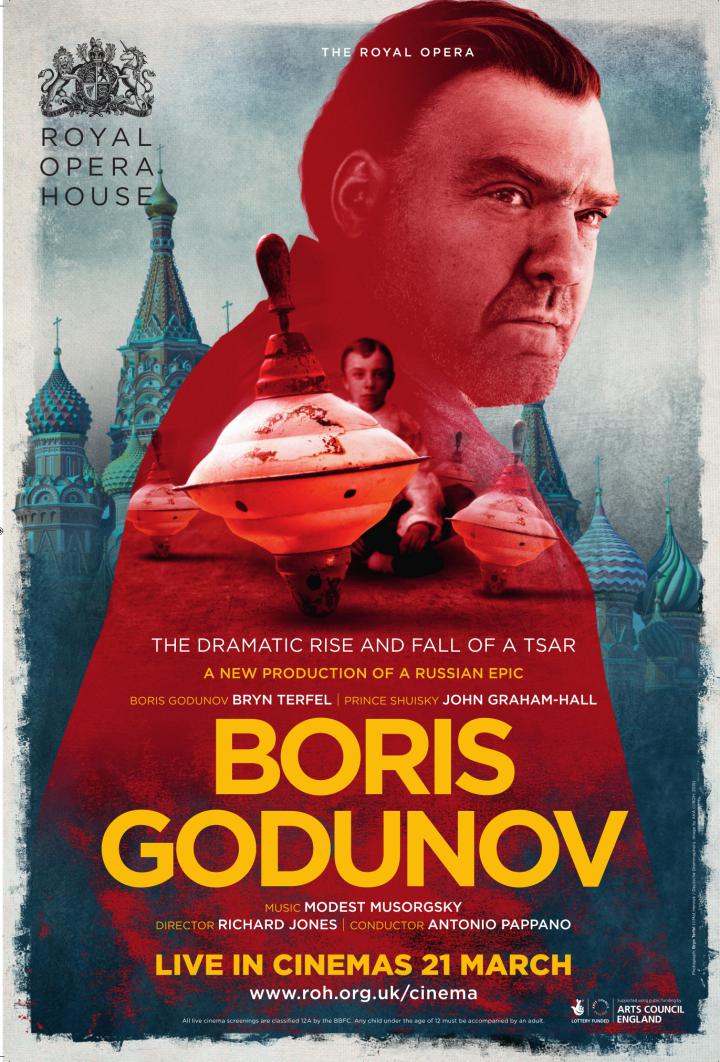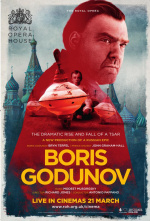Boris Godunov
Terfel makes the title role of Mussorgsky’s flawed masterpiece his own in a powerful new staging of the rarely seen original version.
Boris Godunov
(The Royal Opera House: Boris Godunov)
Part of our Culture Vulture series. For more screenings and information, visit: www.laemmle.com/culturevulture.
Richard Jones and Antonio Pappano renew their creative collaboration with this new production of Musorgsky’s historical masterpiece, here seen in its compact 1869 first version in seven scenes. The originality of the composer’s vision of Pushkin’s play about Tsar Boris Godunov – who reigned over Russia between 1598 and 1605 – was too much for the management of the Imperial Theatres, who demanded changes that were incorporated in the second version of the opera, in which Boris finally had its premiere in 1874. Many commentators, nevertheless, prefer the integrity of the original, which makes few concessions to operatic conventions. Keenly awaited will be Bryn Terfel’s assumption of the title role – one of the most complex characters in opera – while John Graham-Hall appears as the crafty Prince Shuisky and John Tomlinson as the vagabond monk Varlaam.
Credits:
Music ~ Modest Musorgsky
Libretto ~ Modest Musorgsky
Director ~ Richard Jones
Set designer ~ Miriam Buether
Costume designer ~ Nicky Gillibrand
Lighting designer ~ Mimi Jordan Sherin
Movement director ~ Ben WrightConductor ~ Antonio Pappano
Orchestra Orchestra of the Royal Opera House
The Story Begins…
Following the death of the Tsarevich Dmitry, Boris Godunov is persuaded to become Tsar of Russia. However, Boris seems plagued by mysterious guilt. A greedy aristocrat and a restless young monk each plot to turn Boris’s fears to their advantage.
A Historical Drama
Musorgsky based Boris Godunov on the play of the same name by Alexander Pushkin, published in 1831 but the censorial ban on which was only lifted in 1866. Pushkin’s play was loosely inspired by the true story of Boris Godunov, Tsar of Russia from 1598 to 1605. Several of Pushkin’s other characters – such as Grigory Otrepiev and Vasily Shuisky – were also based on historical figures. Musorgsky wrote his own libretto, compressing Pushkin’s 25 scenes into seven scenes or — in the revised version — four acts and a prologue, and using Nikolay Karamzin’s History of the Russian State to help him portray Russian life of the period.
A Tale of Several Versions
Musorgsky completed his first version of Boris Godunov in 1869. It was rejected by the Imperial Theatre in St. Petersburg for having too many choruses, insufficient arias and ‘big tunes’ and no love interest. Musorgsky expanded the opera (including a whole new act) and his second version had a successful premiere in 1874. Due to tragic personal circumstances, it was to be the only opera the composer would complete. Revised editions of Boris Godunov were made after Musorgsky’s death by Rimsky-Korsakov and later by Shostakovich. Most productions now combine elements from both of Musorgsky’s versions of the opera. This production is the first given by The Royal Opera of Musorgsky’s original version.
Musical Invention
Boris Godunov's score is rich in musical invention, including ingenious use of a motif representing Boris’s guilt, folklike songs for the rogue monk Varlaam and the Holy Fool, and imaginative use of arioso (half aria, half accompanied recitative) for Boris’s soliloquies. There are also fine choruses, particularly in the opening scene. The 1869 version is rare in 19th-century opera in having few formal arias and no principal female roles.
Soul-Searching Scenes and Grand Tableaux
Throughout Boris Godunov, grand crowd scenes contrast with intimate depictions of the Tsar and his inner circle. Particular highlights include the Coronation Scene (Scene 2), Boris’s touching scene with his son and daughter in Scene 5, the dramatic encounter outside St Basil’s Cathedral in Scene 6 and — greatest of all — Boris’s farewell to his son in the final scene.
Credits:
Music ~ Modest Musorgsky
Libretto ~ Modest Musorgsky
Director ~ Richard Jones
Set designer ~ Miriam Buether
Costume designer ~ Nicky Gillibrand
Lighting designer ~ Mimi Jordan Sherin
Movement director ~ Ben WrightConductor ~ Antonio Pappano
Orchestra Orchestra of the Royal Opera House
The Story Begins…
Following the death of the Tsarevich Dmitry, Boris Godunov is persuaded to become Tsar of Russia. However, Boris seems plagued by mysterious guilt. A greedy aristocrat and a restless young monk each plot to turn Boris’s fears to their advantage.
A Historical Drama
Musorgsky based Boris Godunov on the play of the same name by Alexander Pushkin, published in 1831 but the censorial ban on which was only lifted in 1866. Pushkin’s play was loosely inspired by the true story of Boris Godunov, Tsar of Russia from 1598 to 1605. Several of Pushkin’s other characters – such as Grigory Otrepiev and Vasily Shuisky – were also based on historical figures. Musorgsky wrote his own libretto, compressing Pushkin’s 25 scenes into seven scenes or — in the revised version — four acts and a prologue, and using Nikolay Karamzin’s History of the Russian State to help him portray Russian life of the period.
A Tale of Several Versions
Musorgsky completed his first version of Boris Godunov in 1869. It was rejected by the Imperial Theatre in St. Petersburg for having too many choruses, insufficient arias and ‘big tunes’ and no love interest. Musorgsky expanded the opera (including a whole new act) and his second version had a successful premiere in 1874. Due to tragic personal circumstances, it was to be the only opera the composer would complete. Revised editions of Boris Godunov were made after Musorgsky’s death by Rimsky-Korsakov and later by Shostakovich. Most productions now combine elements from both of Musorgsky’s versions of the opera. This production is the first given by The Royal Opera of Musorgsky’s original version.
Musical Invention
Boris Godunov's score is rich in musical invention, including ingenious use of a motif representing Boris’s guilt, folklike songs for the rogue monk Varlaam and the Holy Fool, and imaginative use of arioso (half aria, half accompanied recitative) for Boris’s soliloquies. There are also fine choruses, particularly in the opening scene. The 1869 version is rare in 19th-century opera in having few formal arias and no principal female roles.
Soul-Searching Scenes and Grand Tableaux
Throughout Boris Godunov, grand crowd scenes contrast with intimate depictions of the Tsar and his inner circle. Particular highlights include the Coronation Scene (Scene 2), Boris’s touching scene with his son and daughter in Scene 5, the dramatic encounter outside St Basil’s Cathedral in Scene 6 and — greatest of all — Boris’s farewell to his son in the final scene.
Genre
Opera,
Culture Vulture
Runtime
135
Language
English
Director
Richard Jones
Cast
Pimen ~ Ain Anger,
Hostess of the inn ~ Rebecca de Pont Davies,
Nikitich ~ Jeremy White,
Boyar ~ Nicholas Sales
Played at
Town Center 5 5.02.16 - 5.03.16
Monica Film Center 5.02.16 - 5.03.16
Fine Arts Theatre 5.02.16 - 5.03.16
Playhouse 7 5.02.16 - 5.03.16
Claremont 5 5.02.16 - 5.03.16
Boris Godunov Get Tickets
There are currently no showtimes for this film. Please check back soon.

